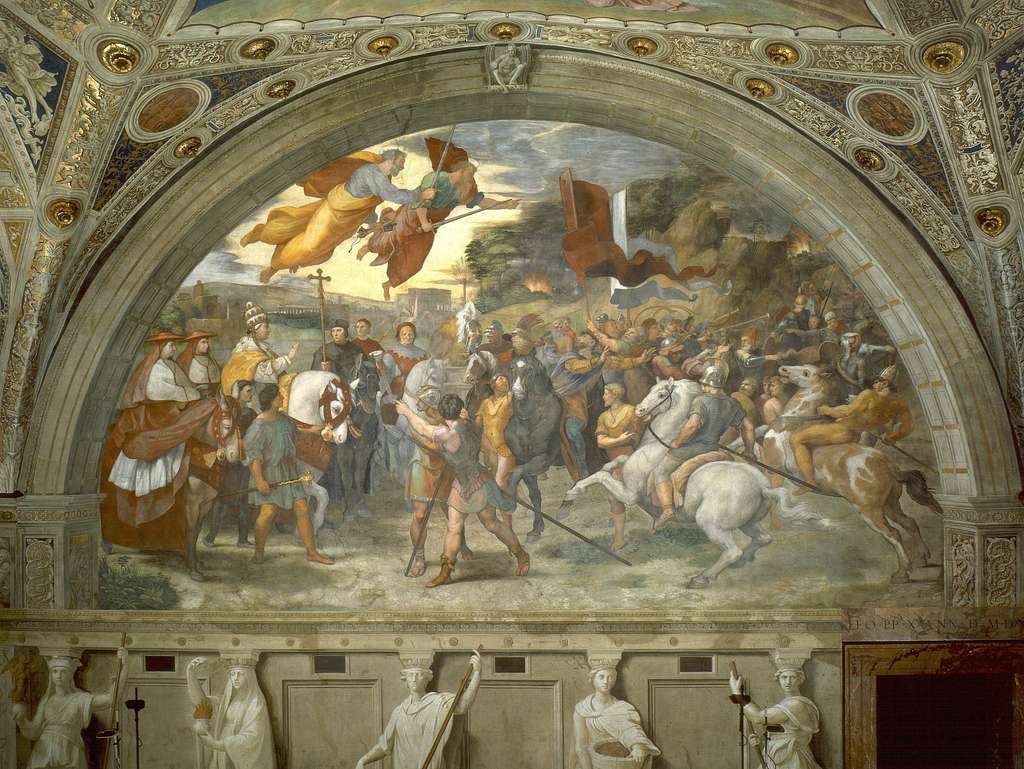Immediately before ascending into Heaven, Our Lord Jesus Christ gave the apostles what has come to be known as the Great Commission: ‘Going therefore, teach ye all nations; baptising them in the name of the Father, and of the Son, and of the Holy Ghost’ (Mt 28:19). With these words, Our Lord made His apostles, and through them, their successors, the teachers of all humanity, that is to say, of each individual soul and of nations as a whole. As their preaching and writings bear witness, the apostles were perfectly well aware of this. While the average first-century Jew expected a Messiah who would reestablish the sovereignty of the Jewish people and become the reference point of the world, the apostles, who had become disciples of the true Messiah – God Himself incarnate – set out to do something far beyond the wildest dreams of any Jew. Namely, not just make all peoples respect the nation of Israel, but actually make all people become Israelites in truth. Indeed, the true Israel is the Church founded by Christ. Through it, one obtains the dignity of the ‘Israel of God’ as St Paul teaches (Gal 6:16). One of the orations of the paschal vigil in the Roman Missal prays that the entire human race may become sons of Abraham and true Israelites.[1] One of the most important consequences of this is that the apostles’ successors are not just ‘religious leaders’ in any ordinary sense of the term. They are the religious leaders of humanity, the only ones commissioned by the true God to rule in the name of Christ and to communicate to all His saving doctrine.
Popes have consistently done this since the beginning, even if during the three first centuries, the fulness of their power was not yet known due to the bloody persecution they endured (they all died martyrs in those centuries, to the extent that being elected pope meant becoming a martyr, which is the reason for which, to this day, a papal funeral is celebrated with red vestments, and likewise the reason for which for centuries, until Francis, the popes wore red shoes). And yet, from their sheltered post in the catacombs, the first bishops of Rome were already forming a new world, undermining the prevailing paganism from the inside, paving the way for the most significant transformation in human history: the creation of Christendom. This alone explains how it was possible that the ink had hardly dried on the Edict of Milan, and the pope became a major figure throughout the Roman Empire.

All of this was possible for one reason alone: the Son of God put Peter and his successors in the papacy directly in charge of the salvation of souls, of all souls and of each soul, one by one. The salvation of souls is the only raison d’être of the existence of the universe, the only reason for the coming of Christ in the flesh, the only reason for the existence of the Catholic Church. Whatever affects a soul affects the Church. Whatever harms a soul harms the Church, and the Church must oppose it.
A Horrible Perversion
What must never be forgotten is that the foundation upon which the entirety of the pope’s mission rests is the faith, that faith which was handed down and received from Jesus Christ Himself, the King of kings and Lord of lords. For the pope to play that superhuman role, it is absolutely essential that he himself remains firmly grounded in the faith and that he never forgets that his primary role is to teach it with clarity and conviction, demanding of all that they respect him as the Vicar of Christ on earth and that they heed his words as those of the One whose place he holds on earth.
The enemy of our salvation is constantly waging war against the Church of Christ to prevent the salvation of souls. That is why Satan lays numerous traps for the pope, one of the most insidious of which has consistently been that of getting overly involved in politics and leaving aside his essential mission. In medieval times, it was easy to distract the pope from his mission. Being a temporal lord, he had to have an army and defend the Pontifical States. Shocking as it may seem today, there were popes who themselves went to war at the head of their armies. This trap was only avoided by saintly pontiffs due to their determination to be primarily not just any spiritual guide but the God-given guide who knows full well that souls on both sides of any conflict are being lost, and it is the Church’s job to save them all.

So, what are the traps laid for the pope in our day? It seems that the age-old temptation to get overly involved in politics has taken on a new, much more deceptive, but also much more destructive form for the contemporary papacy. Modern popes are no longer influential political powers; they allow themselves to get embroiled in politics in other ways. The magna charta of such involvement was Vatican II’s Pastoral Constitution on the Church in the Modern World, Gaudium et Spes. The document proposed establishing a new relationship between the Church and the world, but at a high cost. As a theologian at the Council, the young Joseph Ratzinger had already put his finger on what has revealed itself to be one of the major flaws in the text: ‘Even in its modified form, as found in schema 13 [this was the name of the document during its elaboration], it was obvious what a horrible perversion of Christianity this represents… the schema as a whole tended, in its definition of the relationship between the Christian and the technological world, to see the real meaning of the Christological in the sacred aura it confers upon technological achievement… The schema speaks of the victories of mankind, and means by this the phases of technological progress. The Scriptures also know the language of victory but what they mean is the victory of faith, of love… the great victory of Jesus Christ…’.[2]In other words, the Church now applauds the prowess of mankind, thus seeming to relativise the true victory of Christ over Satan, of good over evil, of virtue over vice, of salvation over damnation, of Heaven over Hell.
Another essential aspect of this involvement in the world is a positive way of viewing non-Christian religions, a view firmly established by another conciliar document, the Declaration on Non-Christian Religions, Nostra Aetate. Ratzinger also had some stiff words to say about this: ‘Here, again, closer reflection will once more demonstrate that not all the ideas characteristic of modern theology are derived from Scripture. This idea is, if anything, alien to the biblical-thought world or even antipathetic to its spirit. The prevailing optimism, which understands the world religions as in some way salvific agencies, is simply irreconcilable with the biblical assessment of these religions’.[3]
What we have then is a new way of looking at things that seeks to give the Church a new status in what was thought to be the emerging new world. Under the influence of neo-modernism, which wanted to make sure that the Church would evolve with the world – such is the very essence of modernism[4] – steps were taken so that the Church could be seen to be interested in things worldly and even interested in error – no longer to correct it as in the past but to show it respect. Otherwise, it was thought no one would listen to the Church anymore. Tragically, few bishops at the time saw clearly what this meant and what the tragic consequences would be. So what did it mean?

When Teachers Fail To Teach
It meant that by her own admission, the Church would refuse to oppose the world unless the world sought to prevent the Church from teaching the faith. Error would not be condemned as long as the Church was free to preach her views. She would accept being towed around by a world in search of new ‘victories’, because her own victory is supposedly no longer of any interest to mankind. But just like the frog slowly boiling in the pot and not realising the fate that will soon be his, so the shepherds of the Church, since Gaudium et Spes, got so used to shaking hands with the world, that when it came time to oppose the world because of grave deviations from God’s law, the response, if any, was so feeble that no one took it seriously.
The manner in which the Church stood by and did virtually nothing when abortion laws were passed in the 1970s is indicative of this. At a time when the world’s bishops still had much moral authority, they failed to use it in defence of life. We are left to wonder how things would have played out if Paul VI and the episcopacies of the major world powers had personally led their faithful en masse in public protest against the very discussion of laws that endangered the most defenceless citizens, the unborn. It’s hard to imagine things would not have been different from what they were. Sadly, the grass had been cut from under their feet by the new approach to the modern world, in which the essential dogma is: The Church stands with the world, and the fundamental precept is: Do not rock the boat. But another precept was critically instrumental in silencing any opposition (in particular within bishops’ conferences): Speak with one voice. In this way, any individual strong voice was left to shout on its own and was either ignored or drowned out by the din of the ‘one voice’, which was not necessarily the voice of truth.[5]
If we add into the mix the well-known fact that many modern Churchmen no longer really believe that souls are in danger, for the simple reason that they have fallen – in practice if not in theory – for the heresy of universalism (‘everyone is saved; Hell is empty’), then we have a perfect recipe for the increased and often disastrous involvement of the Church in worldly concerns. The Church was instituted to save souls, and for this, it was endowed by its Founder with true power even over the secular world; if, however, those who wield this power do not believe souls need saving, then they will inevitably become part of the worldly political show that seeks to promote whatever is the current policy – ‘save the baby whales’ (but not the baby humans), ‘reduce the emissions’ (but use up much more energy trying to do so), ‘open the borders’ (and don’t worry about security or national unity), ‘abolish the death penalty’ (and pretend all human life indistinctly deserves the same protection of the law, regardless of merits or demerits), ‘marriage for all’ (even for those who by the laws of nature are prevented from saying ‘I do’), or whatever happens to be the next fad – and they will cease to lead the Church as Christ intended. Such a spectacle reaches its paroxysm when the Gospel is twisted to support the politics. Then, whoever holds this power is in real danger of being rejected, as was disobedient Saul in favour of David, that is to say, an obedient shepherd who truly has the faith and will lead the Church as Christ meant it to be led.[6]
Such is our present conjuncture. The Church has been sidetracked from her essential role, mainly due to the absence of conviction that souls need saving. This does not seem important anymore. Since we must keep the ever more impressive and ever more complex bureaucracy of the Church going at any cost, involvement in politics – the social gospel in particular – becomes the preferred pastime. And since the Church has no particular grace of state from God to give political advice to world leaders, she is exposed to the ridicule of the world for trying to fix the problems she has no competence for, all the while failing to fix her own.
In Garments All Red (cf. Is 63:2)
As the present pontificate wanes and we send up prayers for the Holy Father, we must also pray incessantly that he be given a successor who will lose no time in recovering the moral high ground, demanding that his God-given authority be respected and obeyed. But even if a future pope wants to do this, how could he go about it?
First of all, he must remember that he is not there to dialogue with the world. He is there to teach authoritatively, not his own evolving, sugar-coated, watered-down gospel, but the eternal Gospel of Jesus Christ and the fulness of the apostolic faith. One of the characteristics of the apostolic teacher is to make things clear and to do so with authority: ‘For he was teaching them as one having power, and not as the scribes and Pharisees’ (Mt 7:29). Similarly, St Paul admonished Timothy: ‘These things command and teach: let no man despise thy youth’ (1 Tm 4:11-12). And again: ‘I charge thee, before God and Jesus Christ, who shall judge the living and the dead, by His coming and His kingdom: preach the word: be instant in season, out of season: reprove, entreat, rebuke in all patience and doctrine’ (2 Tm 4:1-2). And to Titus: ‘These things speak and exhort and rebuke with all authority. Let no man despise thee’ (Tit 2:15). The faith that was once handed down is normative, nor can anyone make it better than it was given to the apostles. It must be taught dogmatically, not just ‘shared’ as one option among many. As G. K. Chesterton would say: ‘A teacher who is not dogmatic is simply a teacher who is not teaching.’ A pope who does not teach the eternal faith authoritatively, eliminating confusion, is not doing the job of a pope and is not worthy of the office.
Second, he will need to remove any cardinals, bishops or priests who do not share this vision of the apostolic priesthood and replace them with men who are truly Catholic. Many other steps must be taken, but they all flow from these two, for if we do not begin with a solid foundation, all we will build is a castle of cards.
All of this, however, concerns the future pope and his closest collaborators. What are the rest of us to do? First of all, pray. Not once in a blue moon in a moment of frustration, but consistently. Every soul that lifts itself up, lifts up the world. Every Catholic that lifts himself up in prayer, by the very fact, lifts up the rest of the Church, including its visible head. We must pray that the next pope will fully retrieve the power of the keys and lead forth his spiritual armies in the conquest of souls to the one true faith outside of which there is no salvation.
Second, never fail to make known your truly Catholic sentiments both to your priests and to your bishops. After all, even if the Church is not a democracy, we are all influenced by each other. Little by little, ideas spread, and convictions change. Modernism slowly eroded the faith in the late nineteenth and early twentieth centuries, making our present predicament possible. Anti-modernism must slowly heal souls and spread its beneficent influence, soul by soul, family by family, priest by priest, bishop by bishop.
Third, be mindful that since the papacy is the supreme form of spiritual paternity on earth, it will recover its lustre only when other forms of paternity are recovered and respected. Every man who is a father must strive strenuously to realise in his own person all that it means to be a good father: to teach, to make decisions, to guide, to sacrifice himself for wife and children: ‘Husbands, love your wives, as Christ also loved the Church and delivered himself up for it’ (Eph 5:25). Every man who is a priest must truly be the father, and not just the leader, of his flock: he must be configured to Christ the eternal High Priest in constant prayer, unfailing charity, unstinting preaching of the faith, ever ready to give his life for those he serves, ever devoted to bearing witness to the One who called him. When these things start to happen, the Church is on the way to genuine reform.
While we pray that all this will come about promptly and peacefully, we cannot forget that the seed from which Christians are born has always been the blood of martyrs. The prophet Isaiah foretold the victory of Christ through blood in a text that the traditional liturgy brings before our eyes each year during both passion and paschaltide: Why then is thy apparel red, and thy garments like theirs that tread in the winepress? I have trodden the winepress alone …, and their blood is sprinkled upon my garments, and I have stained all my apparel (Is 63:2-3).
Our Lord Jesus Christ was stained with the blood of sinners in His Passion. Is it not so, in some way at least, for every man who, through and in Christ, bears his share of paternity, a role in which he sacrificially serves the common good of family, parish, diocese or universal Church? To be a father is to suffer. To be a father is to be ready to die for one’s spouse and children, for one’s parishioners and faithful. If the next pope or the one after him is convinced of this and lives it, we well may expect the dawn of a new era, bright with crimsoned hope.
[1] Missale Romanum, Vigilia Paschalis: ‘ut in Abrahae filios et in Israeliticam dignitatem, totius mundi transeat plenitudo’.
[2] Joseph Ratzinger, Theological Highlights of Vatican II, Paulist Press (1966) p. 228.
[3] Ibid. p. 246.
[4] Modernism is taken in this article in the strict sense of the heresy condemned by St Pius X in the encyclical Pascendi Dominici Gregis in 1907.
[5] Two recent cases confirm this. The first is a scandal that took place at the Catholic Youth Festival in Perth, Australia on 8 December 2019. An aboriginal speaker concluded his talk by invoking the blessing of ‘all the gods’ on those present. Such a grave violation of the First Commandment should have provoked an immediate correction from the several bishops present, but none came. When one of the bishops later brought it to the attention of the archbishop who had organised the event, he was simply ignored. The second is a scandal that took place at the opening Mass of the last session of the Australian Plenary Council, on 3 July 2022, at St Mary MacKillop Memorial Chapel in Sydney. This Mass was preceded by a smoking ceremony in the church at which unnamed ‘spirits’ of ancestors were invoked by an aboriginal woman standing in front of the altar. To this day there has been no explanation from the Australian bishops as to how such an invocation is compatible with the Catholic faith, nor how it could be justified in the context of the immediate preparation for a Catholic Mass. Any voices that have been raised have simply been ignored.
[6] ‘Samuel said to Saul: I will not return with thee, because thou hath rejected the word of the Lord, and the Lord hath rejected thee from being king over Israel’ (1Sam 15:26).


